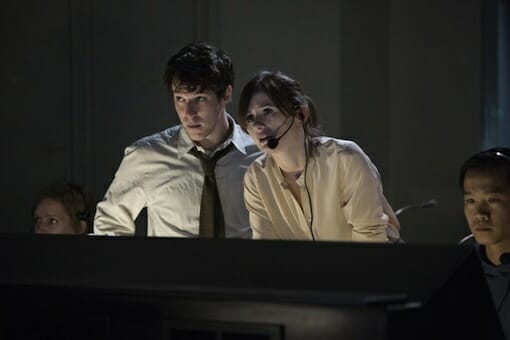Sign up for the
TSL Newsletter
and get $50 off Final Draft 12
By Pete Kane · July 17, 2013

There’s a lot to be said about the second season premiere of The Newsroom, because, well, the premiere says a lot. And shows a lot. And preaches less, but still, a lot.
I have no doubt that detractors of the HBO show will find themselves eager to deride both the premiere and Aaron Sorkin for many of the same faults that still linger from the first season, but what stands out most is that the premiere feels considerably less heavy handed (in terms of tone, not plot), and more focused on engaging us as viewers.
Right from the beginning, where we are treated to a more tightly focused opening credits sequence, it’s clear that Sorkin is giving us a decidedly modified show. The season features a new framing device that begins when we find Will McAvoy (Jeff Daniels) being deposed by Rebecca Halliday (Rosemarie DeWitt), an attorney brought in by Atlantis World Media (AWM) to investigate a news report from News Night that claimed the government used nerve gas during a black-ops mission known as “Genoa.” Will, using his trademark glibness that is equal parts charming and exhausting, takes us back to where the trouble begins, with AWM suffering the repercussions of Will labeling the Tea Party the “American Taliban.”
We also check back in on the complicated love lives of Don (Thomas Sadowski), Maggie (Allison Pill) and Jim (John Gallagher Jr.), and by the time the episode ends Don has left Maggie after being shown a YouTube video of her confessing feelings for Jim to a tour group, and Jim, in a desperate effort to escape his strained relationship with Maggie, has taken a breezy assignment on the road, covering the Mitt Romney campaign. Jim’s escape brings us Jerry Dantana (Hamish Linklater) from DC, who, in his determination to stand out, brings in his own expert on a drone panel discussion, which lays the foundation for the Genoa report that will eventually land Will in the conference room with Rebecca Halliday. The episode also features Charlie (Sam Waterston) getting dressed down by AWM CEO Leona (Jane Fonda) over the Tea Party comment, Neal (Dev Patel) taking interest in the early stages of Occupy Wall Street, and Will singing Rebecca Black.
So yeah, there’s a lot going on.
Some will take undoubtedly issue with how much plot is thrown at them in the premiere, but I think the overcomplicated story is just what the show needs to help steer it more toward being an exciting, behind-the-scenes drama about the daily moral, legal, and interpersonal dilemmas faced by coworkers in a high stress environment, and less toward being a smug, one-hour college course on the downfall of modern America in comparison to the good old days of Murrow and Cronkite.
Sorkin has recently been targeted for reusing common tropes (“Sorkinisms”) that have appeared throughout his prolific career. These little idiosyncratic sayings and expressions have made appearances in his work from the first Broadway performances of A Few Good Men all the way to his Oscar-winning script for The Social Network. In the season premiere, he goes back to the flashback well, a technique that appears in almost all of his work. In this case, the device is a welcome plot enhancement that certainly builds tension and provides the show with a season-long narrative that requires viewers to put two and two together as the story progresses.
Sorkin, perhaps more so than any of his contemporaries, is especially adept at making challenging storylines and concepts easily digestible to the audience while bypassing condescension. His change of pace in terms of both plot and dramatic stakes is an early indication in this second season that the tide of The Newsroom is changing, and while some of the problems of the first season still remain (despite creating The West Wing’s CJ Cregg, one of the most well-written female characters in TV history, the females in The Newsroom still come off as half-drawn cartoon characters), the premiere suggests that perhaps we’re going to be treated to a tighter show in the coming episodes.
All throughout the first season it was painfully aware that there was a great cable drama suffocating under all of the pretension that and self-righteousness that helped turn The Newsroom into a punch line for so many critics and viewers. While aspects of that will always be in the DNA of the show, and who’s to say, that to some degree, they shouldn’t have a place, the second season premiere has shown us that The Newsroom is perhaps ready to be a bit more and to start living up to higher standards, the same sort of standards that drive the actions of its own characters in their attempts to produce a worthy result.